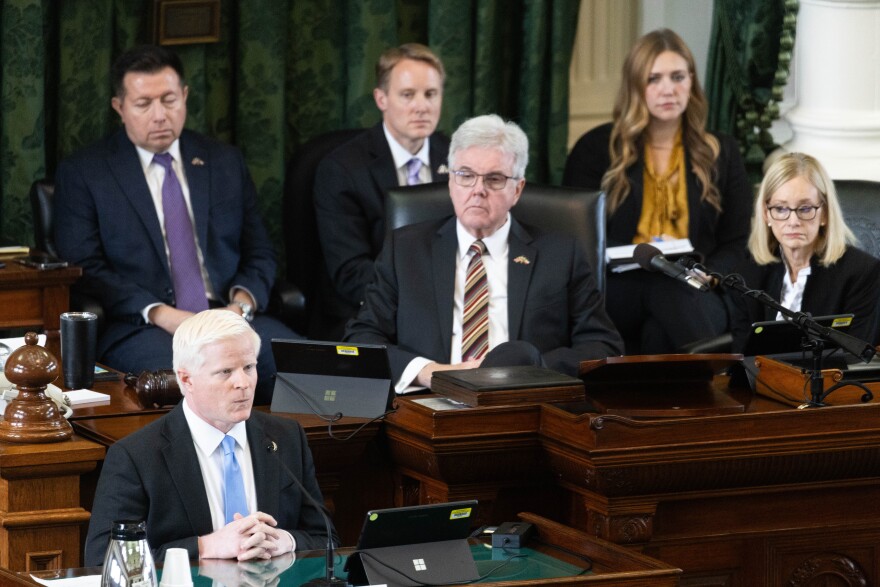With just days left in the impeachment trial of Ken Paxton, Thursday marked defense’s turn to call witnesses and try to exonerate the suspended attorney general.
Trial onlookers were still reeling from a chaotic day in court Wednesday, when House prosecutors unexpectedly rested their case, and the woman Paxton allegedly had an extramarital affair with was expected to testify. Laura Olson was eventually deemed not eligible to testify and never took the stand.
Paxton has been suspended from office since May when the Texas House voted overwhelmingly to impeach the three-term Republican. Paxton is charged with bribery and abuse of office, among other infractions, and remains suspended pending the trial’s outcome.
Texas state senators — minus Paxton’s wife, Sen. Angela Paxton — are serving as jury in the impeachment trial. A two-thirds majority, or 21, would need to vote against Paxton for him to be removed from office.
Each side was allotted 24 hours to present their cases. As of Thursday morning, House impeachment managers had roughly two and a half hours left, while the defense team had about 8 hours and 40 minutes on the clock. Both sides have also been granted additional time for closing arguments, so the jury could be tasked with deciding Paxton’s fate by Friday.
Two of the articles of impeachment against Paxton involve allegations that he misused his office to aid Austin real estate developer Nate Paul in obtaining open records related to law enforcement searches on his properties (Paul, a Paxton campaign donor, is at the center of the impeachment).
The defense’s first witness, Justin Gordon, the open records division chief in the Texas Attorney General’s Office, seemingly disputed the charges that Paxton acted improperly when he forced the open records to be released. Under cross examination, Gordon said that his office’s original draft ruling was not to release the files in response to the open records request from Paul’s lawyer. Gordon’s office ultimately reversed its decision and released the files. Gordon testified that he spoke with Paxton about the records, but he demurred when asked if Paxton had pressured him to reverse his decision.
“I would not classify it as pressure,” he said.

The defense team successfully objected to much of the House’s cross examination, including details about the AG’s office report, which cleared Paxton of improperly terminating the whistleblowers. The defense’s second witness, Austin Kinghorn, associate deputy attorney general for legal counsel in the Texas Attorney General’s office, disputed much of the prosecution’s characterizations of his work on behalf of Paxton.
Prosecutor Erin Epley did draw out an admission from Kinghorn that he saw no legal difference between the interests of Paxton as attorney general and the State of Texas.
"If you had to choose between the State of Texas' interests and the Attorney General's interests, whom do you choose?" asked Epley.
"I don't see those as being in conflict with one another," responded Kinghorn.
The defense then pivoted to address the sixth article of impeachment against Paxton, which alleges he violated the Texas Whistleblowers Act when terminating employees who reported his conduct to the FBI in 2020.
According to House impeachment managers, “Paxton terminated the employees without good cause or due process and in retaliation for reporting his illegal acts and improper conduct.”
The defense called Henry De La Garza, chief employment counsel and ethics adviser to the Office of the Attorney General. De La Garza is also currently the office’s human resources director.
De La Garza testified about how he provided a legal opinion justifying the firing of senior staffers David Maxwell, Ryan Vassar, Mark Penley, and Blake Brickman after they went to the FBI. All four men have previously testified in Paxton’s trial.
Among other causes for dismissal, De La Garza said each had demonstrated insubordinate behavior and demeanor towards their new boss, Brent Webster, who had been appointed first assistant attorney general in October 2020 after Jeff Mateer resigned.

“In many ways it was a situation of an employee with a new boss and having an insubordinate or unprofessional tone towards a new boss and not following orders or directives of the new boss,” De La Garza said, referring to Brickman.
De La Garza also asserted that the Texas Whistleblowers Act did not cover these individuals, as they were high-level policy making appointees. Regardless, he concluded that the Attorney General’s Office had “legitimate, non-retaliatory reasons for terminating their employment.”
Prosecutor Daniel Dutko took De La Garza to task over his interpretation of the Texas Whistleblowers Act, specifically with regard to Maxwell, Vassar, Penley and Brickman’s firing. He noted an appeals court had disagreed with De La Garza’s legal opinion stating the firings were justified and allowable under the act.
He drew an admission from the witness that, as a result, senators were free to disregard his interpretation of the law.
Dutko also noted that each of the four fired individuals were fired based on information about their conduct provided to De La Garza by Webster.
“Doesn’t it seem you have a Brent Webster problem?” Dutko asked.
Dutko then reviewed the provision of the Texas Whistleblowers Act which says that, if an employee is fired within 90 days of reporting allegedly illegal behavior to law enforcement, the presumption is that their firing was retaliatory. He then went through a timeline, showing that one whistleblower after another was fired within 90 days of going to the FBI.
“Have you ever heard the expression, there’s no coincidences in Austin?” Dutko asked before passing the witness back to the defense.
The final defense witness — of both Thursday and the trial — was Grant Dorfman, who started as deputy first assistant attorney general in December 2020.
On cross examination, Dorfman said he’d never had the opportunity to speak with or interview any of the whistleblowers, all of whom had resigned or were fired before he joined the Office of the Attorney General.
And with that, the defense rested its case.
Copyright 2023 KERA




